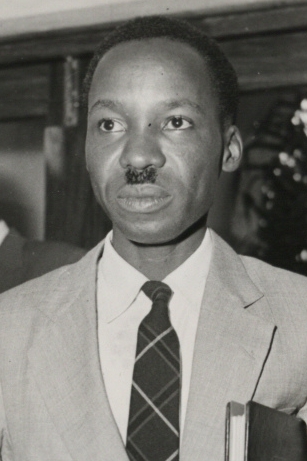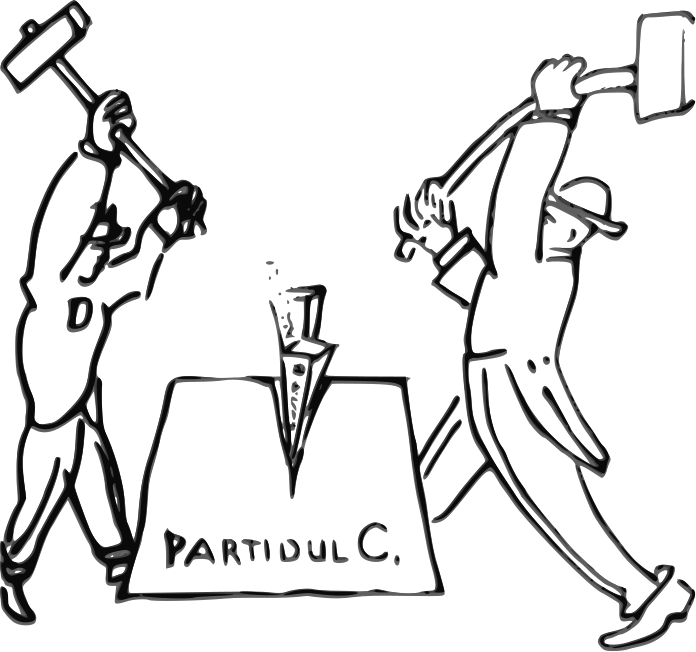|
Nkrumahism
Nkrumaism (sometimes Consciencism) is an African socialist political ideology based on the thinking and writing of Kwame Nkrumah. Nkrumah, a pan-Africanist and socialist, served as Prime Minister of the Gold Coast (later Ghana) from 1952 until 1960 and subsequently as President of Ghana before being deposed by the National Liberation Council in 1966. Definition Nkrumaism is a pan-African socialist theory which aims to adapt Marxist–Leninist theory to the social context of the African continent. Nkrumah defined his belief system as "the ideology of a New Africa, independent and absolutely free from imperialism, organized on a continental scale, founded upon the conception of one and united Africa, drawing its strength from modern science and technology and from the traditional African belief that the free development of each is the condition for the free development of all." The Convention People's Party (CPP), founded by Nkrumah in 1949, writes "Nkrumaism simply means Self ... [...More Info...] [...Related Items...] OR: [Wikipedia] [Google] [Baidu] |
African Socialism
African socialism or Afrosocialism is a belief in sharing economic resources in a traditional African way, as distinct from classical socialism. Many African politicians of the 1950s and 1960s professed their support for African socialism, although definitions and interpretations of this term varied considerably. These politicians include Julius Nyerere of Tanzania, Kwame Nkrumah of Ghana, and Modibo Keita of Mali, among others. Origins and themes As many African countries gained independence during the 1960s, some of these newly formed governments rejected the ideas of capitalism in favour of a more afrocentric economic model. Leaders of this period professed that they were practising "African socialism". Julius Nyerere of Tanzania, Modibo Keita of Mali, Léopold Senghor of Senegal, Kwame Nkrumah of Ghana and Sékou Touré of Guinea, were the main architects of African Socialism according to William H. Friedland and Carl G. Rosberg Jr., editors of the book ''African Socialis ... [...More Info...] [...Related Items...] OR: [Wikipedia] [Google] [Baidu] |
George Padmore
George Padmore (28 June 1903 – 23 September 1959), born Malcolm Ivan Meredith Nurse, was a leading Pan-Africanist, journalist, and author. He left his native Trinidad in 1924 to study medicine in the United States, where he also joined the Communist Party. From there he moved to the Soviet Union, where he was active in the party, and working on African independence movements. He also worked for the party in Germany but left after the rise of Nazism in the 1930s. In 1935, the USSR made a decisive shift in foreign policy: Britain and France, colonial powers with colonies in Africa, were classified as "democratic-imperialisms"—a lower priority than the category of "fascist-imperialist" powers, in which Japan and Germany fell. This shift fell into direct contradiction with Padmore's prioritization of African independence, as Germany and Japan had no colonies in Africa. Padmore broke instantly with the Kremlin, but continued to support socialism.C. L. R. James, ''The Black Jaco ... [...More Info...] [...Related Items...] OR: [Wikipedia] [Google] [Baidu] |
Marcus Garvey
Marcus Mosiah Garvey Sr. (17 August 188710 June 1940) was a Jamaican political activist, publisher, journalist, entrepreneur, and orator. He was the founder and first President-General of the Universal Negro Improvement Association and African Communities League (UNIA-ACL, commonly known as UNIA), through which he declared himself Provisional President of Africa. Ideologically a black nationalist and Pan-Africanist, his ideas came to be known as Garveyism. Garvey was born into a moderately prosperous Afro-Jamaican family in Saint Ann's Bay and he was apprenticed into the print trade as a teenager. Working in Kingston, he got involved in trade unionism before he lived briefly in Costa Rica, Panama, and England. After he returned to Jamaica, he founded the UNIA in 1914. In 1916, he moved to the United States and established a UNIA branch in New York City's Harlem district. Emphasising unity between Africans and the African diaspora, he campaigned for an end to European colonial ... [...More Info...] [...Related Items...] OR: [Wikipedia] [Google] [Baidu] |
Democratic Centralism
Democratic centralism is a practice in which political decisions reached by voting processes are binding upon all members of the political party. It is mainly associated with Leninism, wherein the party's political vanguard of professional revolutionaries practised democratic centralism to elect leaders and officers, determine policy through free discussion, and decisively realise it through united action.Lenin, Vladimir (1906)"Report on the Unity Congress of the R.S.D.L.P." Marxists Internet Archive. Retrieved 14 February 2020. Democratic centralism has also been practised by social democratic and |
Personality Cult
A cult of personality, or a cult of the leader, Mudde, Cas and Kaltwasser, Cristóbal Rovira (2017) ''Populism: A Very Short Introduction''. New York: Oxford University Press. p. 63. is the result of an effort which is made to create an idealized and heroic image of a leader by a government, often through unquestioning flattery and praise. Historically, it has developed through techniques of mass media, propaganda, fake news, spectacle, the arts, patriotism, and government-organized demonstrations and rallies. A cult of personality is similar to apotheosis, except that it is established by modern social engineering techniques, usually by the state or the party in one-party states and dominant-party states. A cult of personality often accompanies the leader of a totalitarian or authoritarian countries. It can also be seen in some monarchies, theocracies, and failed democracies. Background Throughout history, monarchs and other heads of state were often held in enorm ... [...More Info...] [...Related Items...] OR: [Wikipedia] [Google] [Baidu] |
Europe
Europe is a large peninsula conventionally considered a continent in its own right because of its great physical size and the weight of its history and traditions. Europe is also considered a Continent#Subcontinents, subcontinent of Eurasia and it is located entirely in the Northern Hemisphere and mostly in the Eastern Hemisphere. Comprising the westernmost peninsulas of Eurasia, it shares the continental landmass of Afro-Eurasia with both Africa and Asia. It is bordered by the Arctic Ocean to the north, the Atlantic Ocean to the west, the Mediterranean Sea to the south and Asia to the east. Europe is commonly considered to be Boundaries between the continents of Earth#Asia and Europe, separated from Asia by the drainage divide, watershed of the Ural Mountains, the Ural (river), Ural River, the Caspian Sea, the Greater Caucasus, the Black Sea and the waterways of the Turkish Straits. "Europe" (pp. 68–69); "Asia" (pp. 90–91): "A commonly accepted division between Asia and E ... [...More Info...] [...Related Items...] OR: [Wikipedia] [Google] [Baidu] |
Vladimir Lenin
Vladimir Ilyich Ulyanov. ( 1870 – 21 January 1924), better known as Vladimir Lenin,. was a Russian revolutionary, politician, and political theorist. He served as the first and founding head of government of Soviet Russia from 1917 to 1924 and of the Soviet Union from 1922 to 1924. Under his administration, Russia, and later the Soviet Union, became a one-party socialist state governed by the Communist Party. Ideologically a Marxist, his developments to the ideology are called Leninism. Born to an upper-middle-class family in Simbirsk, Lenin embraced revolutionary socialist politics following his brother's 1887 execution. Expelled from Kazan Imperial University for participating in protests against the Russian Empire's Tsarist government, he devoted the following years to a law degree. He moved to Saint Petersburg in 1893 and became a senior Marxist activist. In 1897, he was arrested for sedition and exiled to Shushenskoye in Siberia for three years, where he married ... [...More Info...] [...Related Items...] OR: [Wikipedia] [Google] [Baidu] |
Karl Marx
Karl Heinrich Marx (; 5 May 1818 – 14 March 1883) was a German philosopher, economist, historian, sociologist, political theorist, journalist, critic of political economy, and socialist revolutionary. His best-known titles are the 1848 pamphlet ''The Communist Manifesto'' and the four-volume (1867–1883). Marx's political and philosophical thought had enormous influence on subsequent intellectual, economic, and political history. His name has been used as an adjective, a noun, and a school of social theory. Born in Trier, Germany, Marx studied law and philosophy at the universities of Bonn and Berlin. He married German theatre critic and political activist Jenny von Westphalen in 1843. Due to his political publications, Marx became stateless and lived in exile with his wife and children in London for decades, where he continued to develop his thought in collaboration with German philosopher Friedrich Engels and publish his writings, researching in the British Mus ... [...More Info...] [...Related Items...] OR: [Wikipedia] [Google] [Baidu] |
One-party State
A one-party state, single-party state, one-party system, or single-party system is a type of sovereign state in which only one political party has the right to form the government, usually based on the existing constitution. All other parties are either outlawed or allowed to take only a limited and controlled participation in elections. Sometimes the term "''de facto'' one-party state" is used to describe a dominant-party system that, unlike the one-party state, allows (at least nominally) democratic multiparty elections, but the existing practices or balance of political power effectively prevent the opposition from winning power. Although it is predated by the 1714 to 1783 "age of the Whig oligarchy" in Great Britain, the rule of the Committee of Union and Progress (CUP) over the Ottoman Empire following the 1913 coup d'etat is often considered the first one-party state. Concept One-party states justify themselves through various methods. Most often, proponents of a one- ... [...More Info...] [...Related Items...] OR: [Wikipedia] [Google] [Baidu] |
Neocolonialism
Neocolonialism is the continuation or reimposition of imperialist rule by a state (usually, a former colonial power) over another nominally independent state (usually, a former colony). Neocolonialism takes the form of economic imperialism, globalization, cultural imperialism and conditional aid to influence or control a developing country instead of the previous colonial methods of direct military control or indirect political control (hegemony). Neocolonialism differs from standard globalisation and development aid in that it typically results in a relationship of dependence, subservience, or financial obligation towards the neocolonialist nation. This may result in an undue degree of political control or spiraling debt obligations, functionally imitating the relationship of traditional colonialism. Neocolonialism frequently affects all levels of society, creating neo-colonial systems that disadvantage local communities, such as neo-colonial science. Coined by the French p ... [...More Info...] [...Related Items...] OR: [Wikipedia] [Google] [Baidu] |
Egalitarianism
Egalitarianism (), or equalitarianism, is a school of thought within political philosophy that builds from the concept of social equality, prioritizing it for all people. Egalitarian doctrines are generally characterized by the idea that all humans are equal in fundamental worth or moral status. Egalitarianism is the doctrine that all citizens of a state should be accorded exactly equal rights. Egalitarian doctrines have motivated many modern social movements and ideas, including the Enlightenment, feminism, civil rights, and international human rights. The term ''egalitarianism'' has two distinct definitions in modern English, either as a political doctrine that all people should be treated as equals and have the same political, economic, social and civil rights, or as a social philosophy advocating the removal of economic inequalities among people, economic egalitarianism, or the decentralization of power. Sources define egalitarianism as equality reflecting the natural st ... [...More Info...] [...Related Items...] OR: [Wikipedia] [Google] [Baidu] |
Decolonization
Decolonization or decolonisation is the undoing of colonialism, the latter being the process whereby imperial nations establish and dominate foreign territories, often overseas. Some scholars of decolonization focus especially on separatism, independence movements in the colony, colonies and the collapse of global colonial empires. Other scholars extend the meaning to include economic, cultural and psychological aspects of the colonial experience. Decoloniality, Decolonisation scholars apply the framework to struggles against coloniality of power within Settler colonialism, settler-colonial states even after successful independence movements. Indigenous decolonization, Indigenous and Postcolonialism, post-colonial scholars have critiqued Western worldviews, promoting decolonization of knowledge and the centering of traditional ecological knowledge. Scope The United Nations (UN) states that the human fundamental right to self-determination is the core requirement for decoloniz ... [...More Info...] [...Related Items...] OR: [Wikipedia] [Google] [Baidu] |
.jpg)








